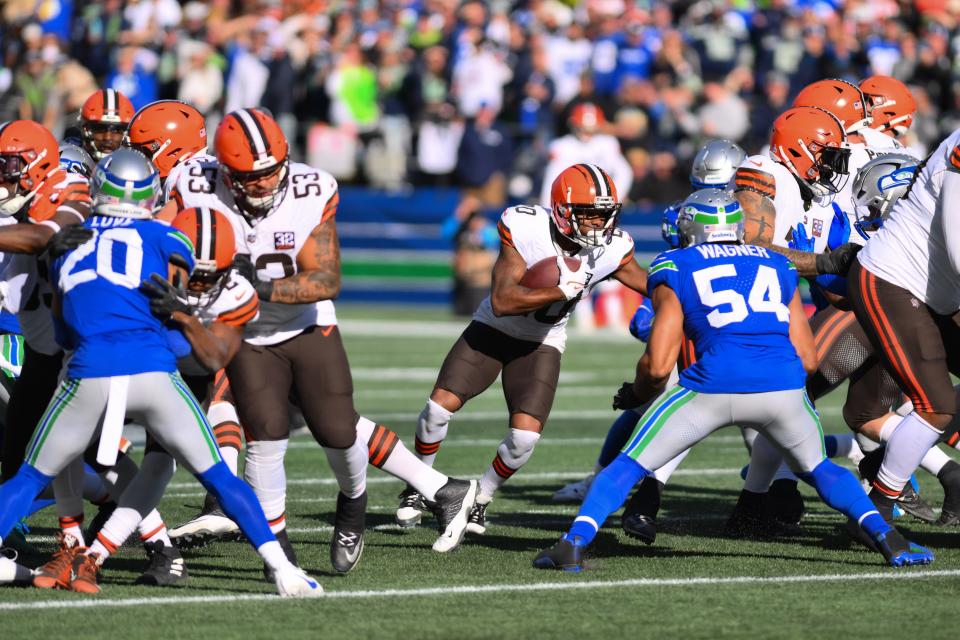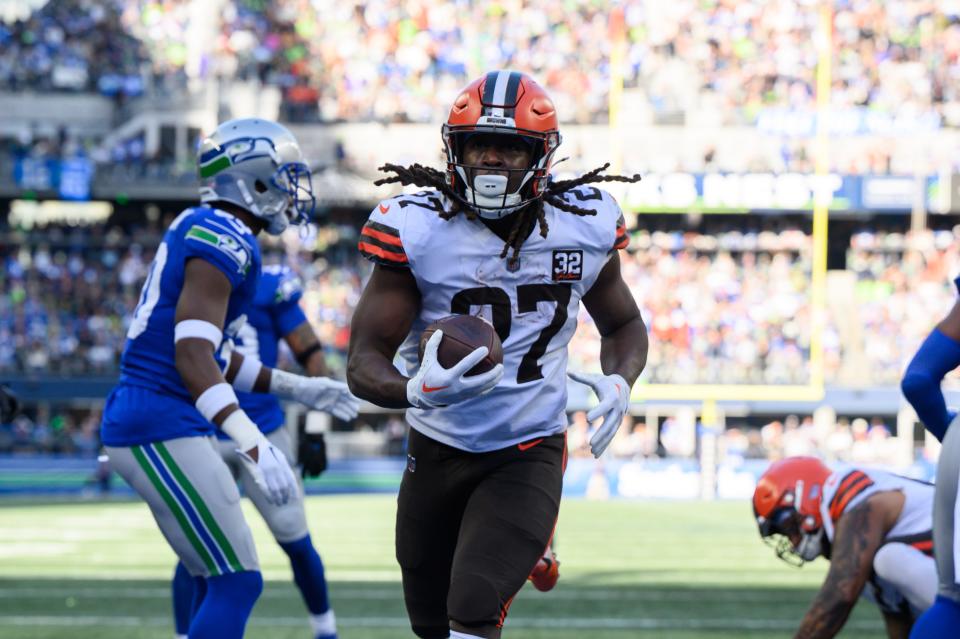Why were Browns screen passes productive? 'Because we work the s*** out of it' | Takeaways
SEATTLE — One of the biggest benefactors of the Browns' screen game during Sunday's 24-20 loss at the Seattle Seahawks was tight end David Njoku. The one who summed up best why screen passes were such a strong piece of the offensive game plan?
Also Njoku.
"Because we work the s*** out of it every day," Njoku said after the game. "We practice it every day. So, kudos to the coaches for putting us in the right situations."
The right situation came after the Browns fell into a 14-0 first-quarter deficit. They were in second-and-9 at their own 29 when quarterback P.J. Walker found running back Kareem Hunt on a screen pass that went for 12 yards.
The Browns went to the screen game again on the very next play, only this time to running back Pierre Strong Jr., and it went for 41 yards to the Seattle 18.
Walker then hit Njoku for an 18-yard touchdown pass on the ensuing play. Suddenly, the Browns were on the board and the offense was starting to move the football.
"We run ball and we sell it," Strong said. "That's just our style to play. We just do. We just execute."
That's where the screen passes really fit in well against the Seahawks. The Browns had their second-best rushing game since Nick Chubb's season-ending Week 2 injury — and 5 yards less than their best rushing performance since then — with 155 yards on 40 carries in Seattle.
That rushing performance effectively kept the Seahawks honest by having to respect the run. That, in turn, allowed the Browns to hit them for some big gains on screens.

That, in turn, allowed the Browns to go from down 14 points to, eventually, up three in the third quarter. In fact, the game-tying drive featured a 41-yard screen to Njoku, pulling the Browns out of a second-and-12 hole at their own 15.
"We go into each week thinking our screen game will be effective, and we take pride in it," Walker said. "We take pride in being an elite screen team, and I thought we did a great job today. We had some big plays. They got us an opportunity to go for it to get in tight to the opportunity to go out there. We got third-and-shorts, fourth-and-shorts because of the screen game. So they was big today."
Kareem Hunt frustrated his number wasn't called upon on critical 3rd down
Kareem Hunt was clearly a frustrated player as he stood in the Browns locker room after Sunday's game. Hunt finished the day as the team's leading rusher with 55 yards on 14 carries, and also ran for a touchdown.
Hunt wasn't frustrated necessarily with the fact the Browns rushed for 155 yards as a team. Or that he, Strong and Jerome Ford each averaged at least 3.9 yards per carry.
"We did a great job running the football as a group," Hunt said. "The running back group is coming together. So is the offensive line. They did a great job today of giving us lanes."

Hunt's frustration was due to the fact his last carry came with 3:36 left in the third quarter. It was a 5-yard run to the Seattle 9, leading to Dustin Hopkins kicking a 27-yard field goal for a 20-17 lead.
The Browns gave the ball to a running back nine times over the final 15 minutes, but never again to Hunt. Specifically, Hunt was frustrated his number wasn't called when the team needed three yards on third down at their own 41 with 2:04 remaining.
"I didn’t get a chance [the] whole fourth quarter, so it's cool," Hunt said. "I don't know. I just go and play my role. That’s what I do."
That third down play ended up in an interception when Walker's pass bounced off the helmet of Seahawks safety Jamal Adams and into Julian Love's hands, setting the stage for Seattle's game-winning drive.
Jedrick Wills Jr., Jerome Ford battle through injuries to play
There were legitimate questions about whether or not Ford or left tackle Jedrick Wills Jr. would play in Seattle. Both were among four listed as questionable for the game with injuries that significantly limited their practice time during the week.
Ford shook off an ankle sprain from the previous Sunday's win over the Indianapolis Colts that reports earlier in the week indicated could force him to miss multiple games. Instead, he rushed for 37 yards on nine carries.
"Yeah, I felt pretty good," Ford said. "Just a little stiffness, but as the game went on and I got running on it, it got better."
The decision on Wills, who sustained a foot and ankle injury during practice, came down to a 15-minute workout a little more than two hours before kickoff. Offensive line coach Bill Callahan flashed a thumbs up sign at the end of it, signaling to coach Kevin Stefanski and general manager Andrew Berry that Wills was good to go.
Wills didn't come out of the game at offensive tackle. James Hudson III, who would've started in Wills' place if he couldn't play, instead filled in for a couple of series while right tackle Dawand Jones was sidelined with a shoulder injury.
"I mean, I could feel it every once in a while," Wills said, "but wasn't anything major."
Chris Easterling can be reached at ceasterling@thebeaconjournal.com. Read more about the Browns at www.beaconjournal.com/sports/browns. Follow him on Twitter at @ceasterlingABJ
This article originally appeared on Akron Beacon Journal: Browns screens successful slowing Seattle Seahawks: Takeaways

